Online life has changed forever post pandemic
More access to health services, learning, and dating online signals life change while privacy concerns leave a bitter taste.

The coronavirus pandemic has led to an increased use of the internet, and increased the confidence among digital citizens, including retirees who had previously been loath to adopt many digital services, a new Avast survey shows.
Indeed, after admitting that it made life more bearable during lockdown, people across different generations say they will continue to engage in their newfound online habits even after the pandemic wanes.
For digital citizens of all ages, the pandemic has been an important and lifeaffirming outlet. The internet has helped them stay in touch with friends and family, increase their time on social media sites, access online health services, and experience online dating in a new and engaging way.
But there’s another side to that story, the global Avast study shows. While people are still more than happy to use online services and engage digitally in completely new ways, they’re still exceedingly privacy-conscious.
And while they may want to be digital citizens in the wake of the coronavirus pandemic, they’re still firmly aware of the trials that face them from bad actors and scammers. In fact, their privacy concerns are so great, according to a survey of more than 16,000 online users across 17 countries, that they stopped themselves from going even further into the digital ecosystem for fear of the ramifications.
Read on to learn more about how the pandemic has changed how people use the internet.

For this report, Avast has done a survey among 16,147 online users in 17 countries around the world. Avast commissioned the survey to the research institution YouGov in Argentina, Australia, Brazil, Czech Republic, France, India, Japan, Mexico, New Zealand, Russia, Slovakia, Spain, United Kingdom and United States, and to the research institution Forsa in Austria, Germany and Switzerland (Swiss German speaking population only).
The survey was run as a representative survey among over 1,000 people in each region, apart from Austria and Switzerland, where Forsa surveyed over 500 people each. The global data points in this report are covering results of all regions, apart from data points that show results by age groups or gender, where results from German speaking markets are excluded.
Table of contents
Importance of the internet
The pandemic has fundamentally changed how people view the internet, according to the Avast survey.
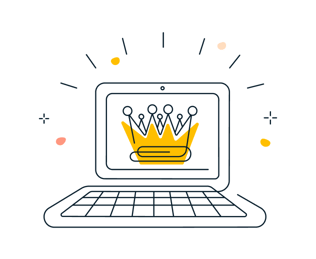 Six in ten online users around the world say that the pandemic caused the internet to take on greater importance in their lives.
Six in ten online users around the world say that the pandemic caused the internet to take on greater importance in their lives.
In the United States, for instance, 31% of respondents said the internet had become “much more important” to their lives, compared to just 11% of respondents in Germany. In India, a whopping 70% of people said the internet had become “much more important” to their lives.
Not surprisingly, a small number of people said the internet had become less important to them. In fact, just 2% of people around the globe said the internet lost some of its luster in their lives during the height of the pandemic.
How has the importance of the internet changed for you since the start of the Covid pandemic?
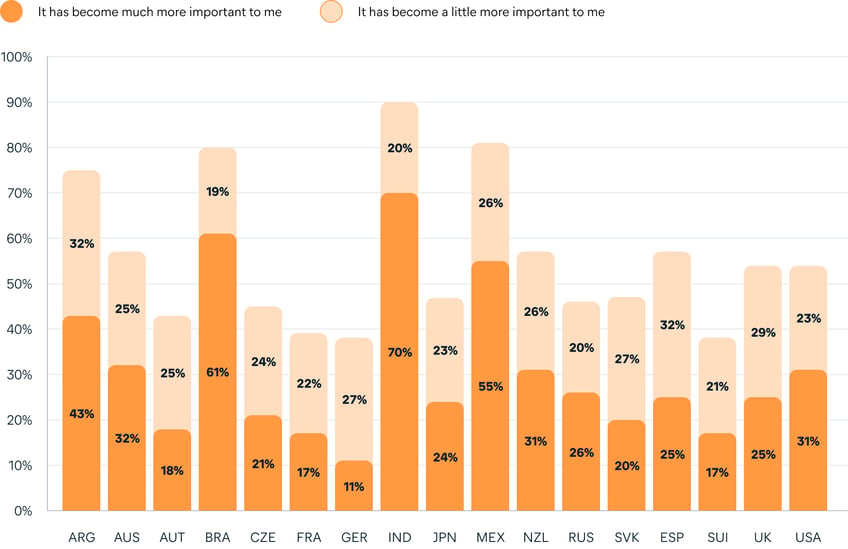
Relevance for different age groups
Age also played a role in whether the internet made a bigger impact on a user’s life.
More than two-thirds of 18 to 24-year olds said the internet has become much more, or a little more important, compared to 46% of global digital citizens over the age of 65.
How has the importance of the internet changed for you since the start of the Covid pandemic?
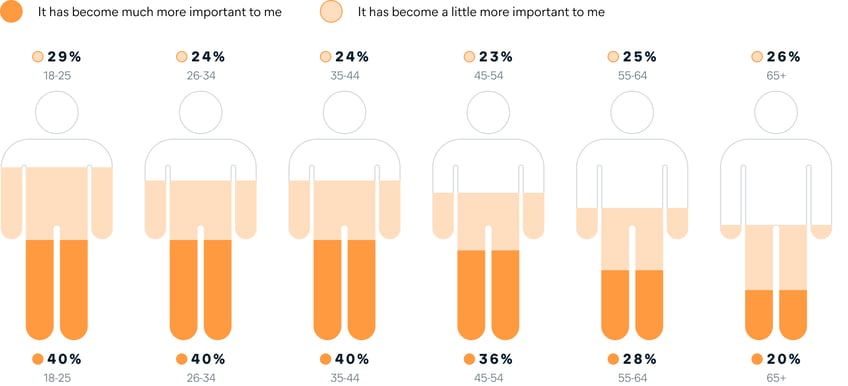
Higher relevance of the internet for people living in cities
Location also plays a role in how people view the pandemic’s influence on their internet experience.
Those who live in large metropolitan areas report finding the internet to be a more positive influence on their lives than those who say they live in more rural areas. In the United Kingdom, for example, 67% of those who live in London say the internet has become more important for them. While it’s unclear exactly why the internet’s impact was felt so differently based on a person’s location, it may be due to the fact that many living in cities were forced inside with little time outdoors. In rural areas, however, they had more space and possibilities to spend time outside and in nature.
How has the importance of the internet changed since the start of the Covid-19 pandemic for people in the UK?
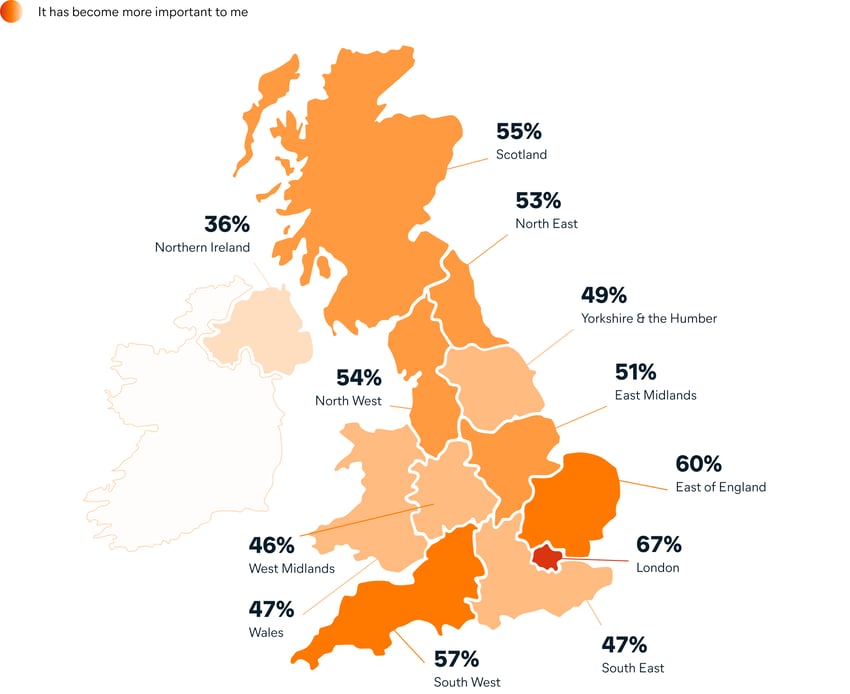
The internet making people’s lives more bearable
Indeed, the challenge for many during the height of lockdowns has proven to be making life a bit more enjoyable.
For 34% of people globally, the internet became their outlet to make life more bearable during the pandemic, according to our survey. In Latin American countries, India, and Spain, the internet’s effect was felt most acutely, with more than half of the population saying it had made life more bearable. Just 18% of Japanese respondents said the internet made their lives more bearable, putting them at the bottom of our survey.
The internet has made my day-to-day life more bearable during the pandemic
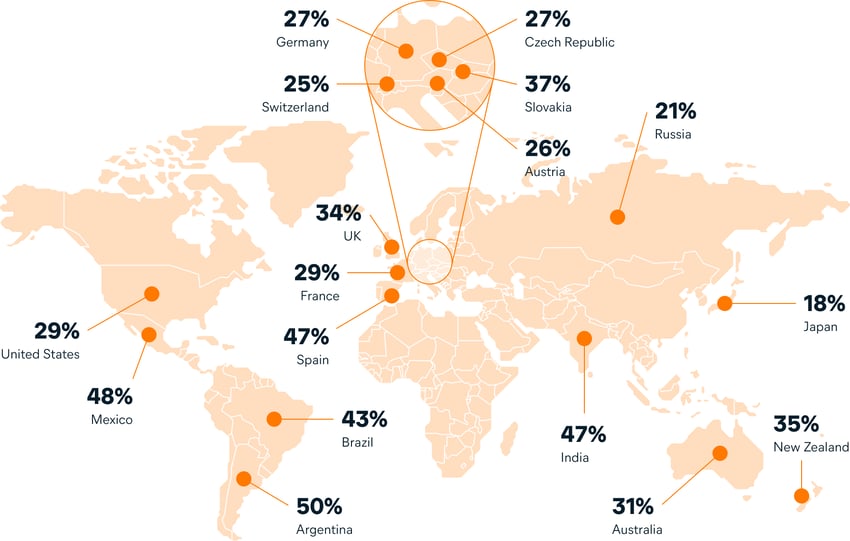
The internet making people’s lives more bearable
Age and its impact on the internet making life more bearable during the pandemic proved to be the most telling takeaway from our survey.
Although younger people are more readily adopting the internet for their own entertainment and digital efforts, the same holds true for older respondents.
Globally, in fact, 37% of people between the ages of 18 and 24 said the internet made their lives more bearable during the pandemic, nearly matching the 36% of people 65 years of age and older who said the same.
On a country-by-country basis, the impact the internet had on older people was even more striking. In the United States, for instance, 40% of people over 65 said the internet made their lives more bearable. In Argentina and Brazil, those numbers swelled to 62% and 61%, respectively.
The internet has made my day-to-day life more bearable during the pandemic
| Age |
Total |
18-24 |
25-34 |
35-44 |
45-54 |
55-64 |
+65 |
| Total |
35% |
37% |
34% |
35% |
35% |
36% |
36% |
| Argentina |
50% |
42% |
44% |
51% |
52% |
55% |
62% |
| Australia |
31% |
36% |
41% |
41% |
20% |
26% |
22% |
| Brazil |
43% |
37% |
39% |
40% |
48% |
45% |
61% |
| Czech Republic |
27% |
24% |
23% |
27% |
32% |
26% |
33% |
| France |
29% |
35% |
34% |
27% |
24% |
23% |
32% |
| India |
47% |
40% |
45% |
45% |
54% |
51% |
62% |
| Japan |
18% |
23% |
17% |
17% |
13% |
20% |
19% |
| Mexico |
48% |
46% |
38% |
45% |
51% |
61% |
55% |
| New Zealand |
35% |
35% |
39% |
37% |
33% |
33% |
33% |
| Russia |
21% |
17% |
16% |
18% |
20% |
24% |
29% |
| Slovakia |
37% |
40% |
35% |
27% |
38% |
41% |
44% |
| Spain |
47% |
56% |
46% |
40% |
45% |
52% |
47% |
| United Kingdom |
34% |
46% |
26% |
36% |
32% |
32% |
36% |
| United States |
29% |
30% |
24% |
30% |
20% |
28% |
40% |
| Age |
Total |
18-29 |
30-44 |
45-59 |
60+ |
| Germany |
27% |
48% |
33% |
19% |
17% |
| Age |
Total |
18-44 |
45+ |
| Austria |
26% |
28% |
24% |
| Switzerland |
25% |
28% |
22% |
People will continue to do more things online
With more time spent using the internet, plenty of people around the globe saw value in all it provided.
But as life starts to return to normal around the world, the question on our minds was how many of those who discovered a newfound interest in the internet would actually keep up those activities?
Our study shows that one-third of global respondents plan to continue to do more things online as it makes life easier in general. There was also a direct link between those countries that found life more bearable because of the internet and their intentions post-pandemic: the more likely you are to believe the internet made your life more bearable, the more likely you are to use the internet heavily post-pandemic.
I'll continue to do more things online after the pandemic as it makes life easier
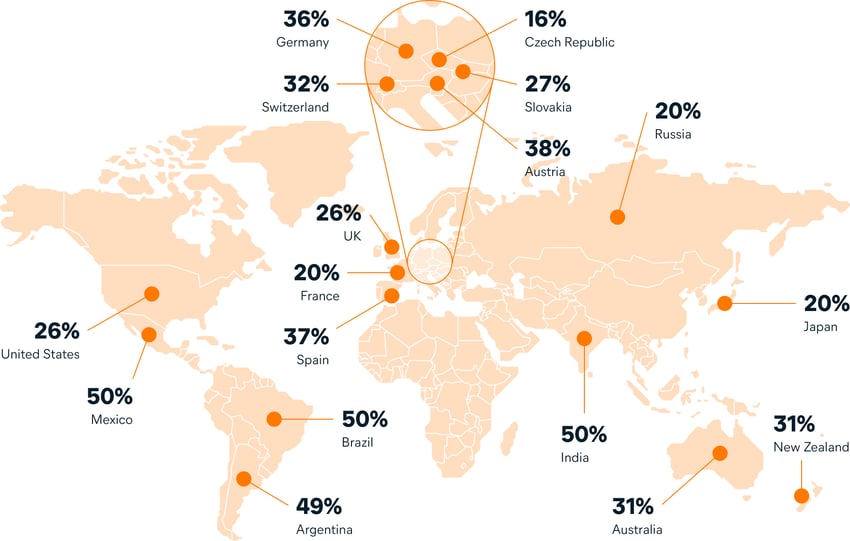
The internet as a source for new experiences
So, how did the internet make life more bearable for so many global citizens?
In our survey, we analyzed how people used the internet during the pandemic and found that they often turned to the internet to help them experience and learn new things. Between 29% and 33% of those between the ages of 18 to 54 said they engaged in new experiences on the internet during the pandemic, compared to 23% of those over the age of 65. Interestingly, those living in Mexico and Brazil were especially impacted by the internet’s opportunities.
The internet has helped me experience / learn new things during the pandemic
| Age |
Total |
18-24 |
25-34 |
35-44 |
45-54 |
55-64 |
65+ |
| Total |
29% |
33% |
29% |
30% |
31% |
28% |
23% |
| Argentina |
43% |
32% |
38% |
44% |
47% |
54% |
42% |
| Australia |
27% |
36% |
32% |
32% |
21% |
24% |
18% |
| Brazil |
46% |
42% |
44% |
44% |
46% |
49% |
66% |
| Czech Republic |
20% |
17% |
17% |
19% |
26% |
19% |
19% |
| France |
17% |
25% |
20% |
19% |
16% |
15% |
16% |
| India |
53% |
43% |
52% |
57% |
60% |
57% |
50% |
| Japan |
14% |
23% |
12% |
13% |
13% |
13% |
12% |
| Mexico |
50% |
49% |
41% |
47% |
54% |
57% |
69% |
| New Zealand |
25% |
26% |
25% |
28% |
22% |
24% |
23% |
| Russia |
18% |
16% |
19% |
18% |
21% |
19% |
12% |
| Slovakia |
26% |
38% |
20% |
25% |
28% |
27% |
22% |
| Spain |
29% |
41% |
22% |
20% |
33% |
31% |
33% |
| United Kingdom |
17% |
25% |
11% |
22% |
14% |
16% |
16% |
| United States |
22% |
23% |
23% |
22% |
25% |
21% |
18% |
| Age |
Total |
18-29 |
30-44 |
45-59 |
60+ |
| Germany |
14% |
21% |
12% |
14% |
11% |
| Age |
Total |
18-44 |
45+
|
| Austria |
16% |
16% |
15% |
| Switzerland |
15% |
20% |
11% |
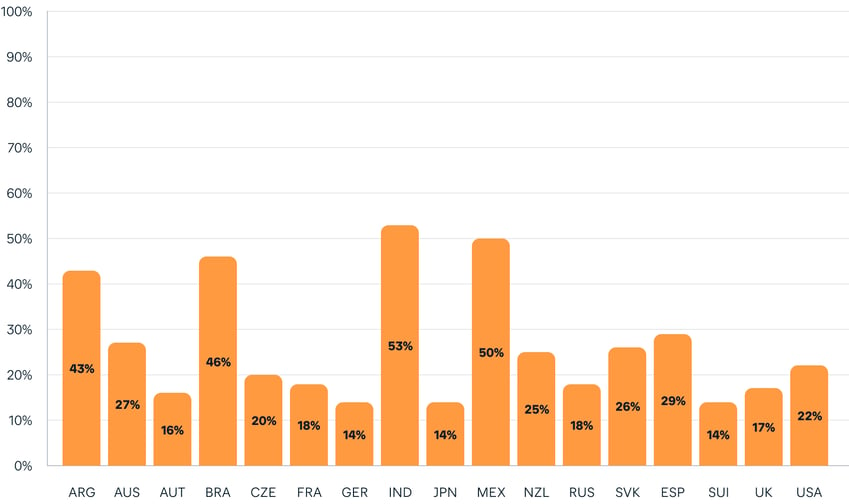
Social media as a favorite online activity
Social media is a favorite pastime among nearly all age groups, according to the Avast survey.
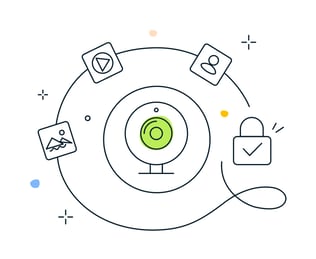 Two-thirds of internet users around the world, including 54% of those over the age of 65 report using social media services like Facebook, Instagram, and Twitter at least once a day. Another 16% of people use social media sites several times a week.
Two-thirds of internet users around the world, including 54% of those over the age of 65 report using social media services like Facebook, Instagram, and Twitter at least once a day. Another 16% of people use social media sites several times a week.
In our survey, we found that women are far more likely to be daily social media users than men, though male respondents said they were more likely to check social media on a weekly or monthly basis compared to female respondents.
Global: How often, if ever, do you participate in the following online activites? - Using Social media (e.g. Facebook, Instagram, Twitter)
| |
Male |
Female |
| At least one a day |
62% |
72% |
| Several times a week or month |
18% |
14% |
| Less than several times a month or never |
20% |
15% |
| |
Global |
| At least once a day |
67% |
| Several times a week or month |
16% |
| Less than several times a month or never |
17% |
Dating, sports class and banking moved to the online world
Aside from social media, we found that people around the globe were more likely to engage in a host of activities during the pandemic.
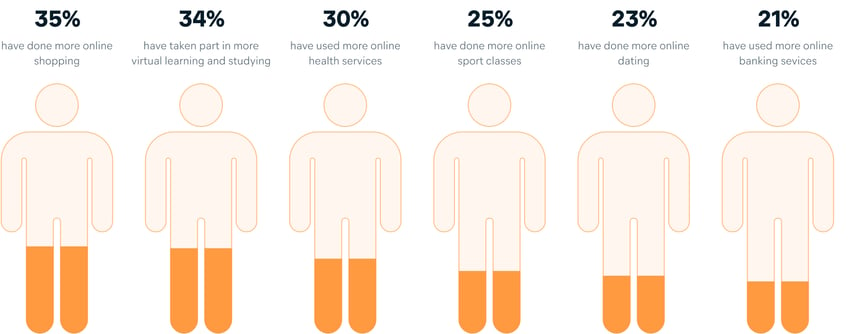
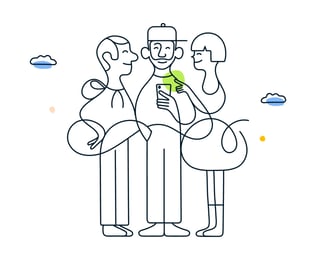
| Video calling with friends and family |
38% |
| Watching videos, movies or series |
35% |
| Staying in contact with friends and family via messenger services, emails |
35% |
| Online shopping |
35% |
| Virtual studying or classes (e.g. as part of school or University program, or personal development) |
34% |
| Using Social media (e.g. Facebook, Instagram, Twitter) |
32% |
| Virtual health services (e.g. doctor consultations, health classes by health insurance) |
30% |
| Reading or watching news |
30% |
| Listening to music, radio, audio books or podcasts |
27% |

| Using a search engine (e.g. Google or Bing) |
26% |
| Gaming |
26% |
| Online sports classes or sports videos (e.g. on YouTube) |
25% |
| Digital culture experiences, e.g. virtual museum visits, concerts or theatre plays |
24% |
| Using emails to organize things in my life (arranging appointments, inquiring about services at businesses and authorities) |
24% |
| Online dating |
23% |
| Banking / finance activities |
21% |
| Selling goods online |
19% |
Keeping in touch with loved ones
Video calling became a way of life for many during the height of the pandemic
 Video calling became a way of life for many during the height of the pandemic. In fact, 22% of people around the globe said the pandemic forced them for the first time to start using video calling services. But it was all for a good cause:
Video calling became a way of life for many during the height of the pandemic. In fact, 22% of people around the globe said the pandemic forced them for the first time to start using video calling services. But it was all for a good cause:
40% of respondents said that the internet helped them to keep in touch with loved ones during the pandemic.
The internet has helped me keep in touch with loved ones during the pandemic
| Age |
Total |
18-24 |
25-34 |
35-44 |
45-54 |
55-64 |
+65 |
| Total |
42% |
40% |
42% |
40% |
41% |
43% |
43% |
| Argentina |
56% |
40% |
51% |
56% |
62% |
67% |
64% |
| Australia |
36% |
38% |
36% |
46% |
32% |
31% |
34% |
| Brazil |
51% |
37% |
44% |
49% |
61% |
60% |
60% |
| Czech Republic |
33% |
38% |
34% |
26% |
31% |
35% |
39% |
| France |
31% |
38% |
39% |
29% |
27% |
26% |
32% |
| India |
56% |
50% |
52% |
57% |
59% |
65% |
67% |
| Japan |
21% |
32% |
31% |
17% |
15% |
22% |
17% |
| Mexico |
54% |
40% |
47% |
47% |
61% |
70% |
70% |
| New Zealand |
44% |
38% |
46% |
43% |
32% |
44% |
54% |
| Russia |
34% |
31% |
35% |
30% |
34% |
35% |
42% |
| Slovakia |
42% |
35% |
45% |
32% |
44% |
46% |
50% |
| Spain |
52% |
54% |
50% |
45% |
47% |
55% |
67% |
| United Kingdom |
38% |
46% |
41% |
40% |
33% |
35% |
38% |
| United States |
33% |
28% |
28% |
30% |
34% |
37% |
41% |
| Age |
Total |
18-29 |
30-44 |
45-59 |
60+ |
| Germany |
31% |
51% |
35% |
23% |
22% |
| Age |
Total |
18-44 |
45+ |
| Austria |
31% |
35% |
28% |
| Switzerland |
24% |
28% |
21% |
Increased confidence when using the internet
The pandemic has also improved the broader belief among older users, especially, that they can adequately use the internet without much issue.
In fact, 18% of people over the age of 65 said they’re now more confident online since they’ve been forced to use the internet more during the pandemic. That was approximately in line with the 20% of people between the ages of 18 and 34 who said the same, and matched the 18% of people between the ages of 35 to 44 who said they’re more confident than ever using the internet because of the pandemic’s influence.
Moreover, just 7% of respondents said that they found it difficult to adapt to doing more things online during the pandemic.
I have become more confident using technology as I've been forced to use it more
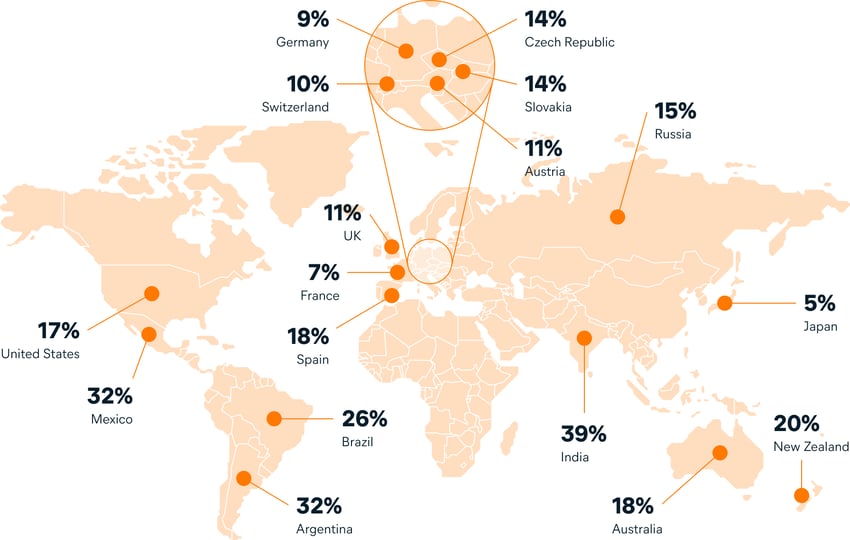
Increased confidence when using the internet

I have become more confident using technology since the start of the pandemic as I've been forced to use it more
| Age |
Total |
18-24 |
25-34 |
35-44 |
45-54 |
55-64 |
+65 |
| Total |
19% |
20% |
20% |
18% |
19% |
20% |
18% |
| Argentina |
32% |
24% |
28% |
32% |
29% |
40% |
38% |
| Australia |
18% |
22% |
18% |
18% |
15% |
18% |
15% |
| Brazil |
26% |
28% |
25% |
20% |
30% |
30% |
25% |
| Czech Republic |
14% |
8% |
14% |
12% |
14% |
15% |
14% |
| France |
7% |
4% |
8% |
8% |
6% |
6% |
7% |
| India |
39% |
30% |
42% |
38% |
43% |
46% |
51% |
| Japan |
5% |
9% |
6% |
4% |
6% |
5% |
5% |
| Mexico |
32% |
29% |
30% |
25% |
27% |
43% |
52% |
| New Zealand |
20% |
20% |
21% |
17% |
16% |
19% |
26% |
| Russia |
15% |
13% |
17% |
11% |
18% |
15% |
18% |
| Slovakia |
14% |
18% |
8% |
15% |
17% |
14% |
15% |
| Spain |
18% |
19% |
13% |
11% |
16% |
24% |
25% |
| United Kingdom |
11% |
12% |
6% |
10% |
10% |
16% |
13% |
| United States |
17% |
16% |
23% |
16% |
16% |
14% |
14% |
| Age |
Total |
18-29 |
30-44 |
45-59 |
60+ |
| Germany |
27% |
48% |
33% |
19% |
17% |
| Age |
Total |
18-44 |
45+ |
| Austria |
26% |
28% |
24% |
| Switzerland |
25% |
28% |
22% |
Data protection important for the majority of users
Many people stopped performing online activities because of their security and privacy fears.
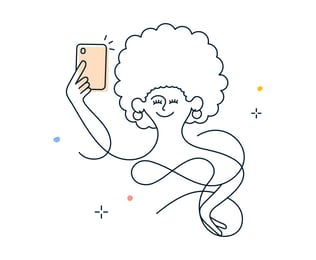 And it’s perhaps no surprise that security and privacy took center stage in the average global citizen’s concerns about their renewed interest in the internet. Indeed, security and privacy appears to be top-of-mind with many respondents. More than eight in ten of global digital citizens said data protection is an important component in their digital lives. Two-thirds of respondents even went so far as to say that they decided against engaging in certain online behaviors because of security and privacy concerns.
And it’s perhaps no surprise that security and privacy took center stage in the average global citizen’s concerns about their renewed interest in the internet. Indeed, security and privacy appears to be top-of-mind with many respondents. More than eight in ten of global digital citizens said data protection is an important component in their digital lives. Two-thirds of respondents even went so far as to say that they decided against engaging in certain online behaviors because of security and privacy concerns.
The protection of my data is very important to me
| Age |
Total |
18-24 |
25-34 |
35-44 |
45-54 |
55-64 |
+65 |
| United States |
77% |
60% |
68% |
72% |
85% |
84% |
91% |
| United Kingdom |
85% |
75% |
81% |
83% |
84% |
91% |
90% |
| Spain |
87% |
84% |
80% |
87% |
87% |
90% |
90% |
| Slovakia |
85% |
79% |
85% |
81% |
91% |
87% |
79% |
| Russia |
86% |
81% |
84% |
85% |
88% |
88% |
88% |
| New Zealand |
84% |
77% |
78% |
84% |
83% |
88% |
92% |
| Mexico |
88% |
80% |
87% |
87% |
90% |
94% |
94% |
| Japan |
71% |
70% |
66% |
40% |
43% |
45% |
51% |
| India |
85% |
82% |
85% |
89% |
86% |
85% |
79% |
| France |
80% |
76% |
74% |
73% |
77% |
84% |
88% |
| Czech Republic |
78% |
68% |
75% |
80% |
81% |
78% |
82% |
| Brazil |
89% |
81% |
88% |
87% |
93% |
94% |
91% |
| Australia |
87% |
88% |
80% |
85% |
89% |
87% |
93% |
| Argentina |
88% |
81% |
86% |
84% |
91% |
95% |
95% |
| Age |
Total |
18-29 |
30-44 |
45-59 |
60+ |
| Germany |
79% |
70% |
76% |
83% |
85% |
| Age |
Total |
18-44 |
45+ |
| Austria |
77% |
71% |
82% |
| Switzerland |
77% |
70% |
82% |
Safety and privacy concerns inhibiting people online
Many people stopped performing online activities because of their security and privacy fears.
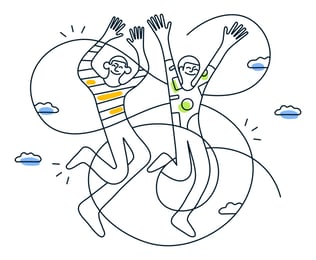 Our survey found that women were more likely than men to worry about privacy and security concerns, and 69% of those over the age of 65 had security and privacy worries, outpacing their younger counterparts. Despite that, the results from our survey clearly illustrate just how loath people are to engage in any activity they deem unsafe.
Our survey found that women were more likely than men to worry about privacy and security concerns, and 69% of those over the age of 65 had security and privacy worries, outpacing their younger counterparts. Despite that, the results from our survey clearly illustrate just how loath people are to engage in any activity they deem unsafe.
While 63% of people over the age of 65 said they didn’t do something online because of their online security and privacy concerns, 69% of those between the ages of 18 and 24 said the same. Two-thirds of those between the ages of 25 and 34 similarly stopped performing online activities because of their security and privacy fears.
Have you ever decided not to do something online, because of concerns about your online security and/or privacy?
| Age |
Total |
18-24 |
25-34 |
35-44 |
45-54 |
55-64 |
+65 |
| Total |
65% |
68% |
67% |
64% |
64% |
65% |
63% |
| Argentina |
72% |
71% |
71% |
71% |
77% |
75% |
64% |
| Australia |
71% |
72% |
69% |
68% |
73% |
75% |
71% |
| Brazil |
78% |
72% |
81% |
79% |
81% |
79% |
66% |
| Czech Republic |
46% |
46% |
51% |
46% |
47% |
44% |
41% |
| France |
65% |
74% |
59% |
62% |
66% |
65% |
66% |
| India |
58% |
66% |
60% |
56% |
58% |
50% |
31% |
| Japan |
45% |
42% |
48% |
40% |
43% |
45% |
51% |
| Mexico |
75% |
75% |
75% |
77% |
72% |
77% |
70% |
| New Zealand |
63% |
72% |
70% |
63% |
59% |
61% |
57% |
| Russia |
73% |
73% |
81% |
72% |
74% |
68% |
74% |
| Slovakia |
57% |
62% |
55% |
61% |
53% |
56% |
53% |
| Spain |
73% |
81% |
74% |
70% |
69% |
78% |
66% |
| United Kingdom |
66% |
65% |
67% |
60% |
64% |
67% |
69% |
| United States |
72% |
63% |
71% |
69% |
73% |
72% |
78% |
| Age |
Total |
18-29 |
30-44 |
45-59 |
60+ |
| Germany |
63% |
62% |
66% |
67% |
57% |
| Age |
Total |
18-44 |
45+ |
| Austria |
54% |
50% |
58% |
| Switzerland |
53% |
48% |
57% |
Privacy concerns limiting people’s online experience
People don't feel completely free online
While a healthy distrust is good for people to stay safe, privacy and security concerns also inhibit people. While the online world could make their lives easier, they don’t feel completely free to do what they want when they want. Two out of three (65%) of all respondents have decided not to do something due to security or privacy concerns. Out of these, for example, 30% have decided against using public Wi-Fi out of privacy concerns. While concerns about public Wi-Fi are reasonable, using a virtual private network (VPN) can help users to stay protected while staying connected.
But it doesn’t stop there. Twenty-eight percent of respondents decided against purchasing an online item because of their privacy concerns and 37% of people said they abandoned a decision to sign up for a website because of privacy issues. Some users wouldn’t even book online travel or use smart home devices like the Amazon Echo or Google Home. The problem is compounded by a general lack of understanding and knowledge about online privacy rights. Indeed, just 53% of people say they’re well-versed on privacy rights and 49% of global citizens actually read a website’s privacy policies.
What’s worse, only 43% of respondents have strong trust in data protection laws. More than a third of respondents also said calls for enhanced data protection are exaggerated. Looking ahead, however, some of those attitudes could shift. While more than nine in ten respondents in the U.S. and UK over the age of 65 say their data protection is “very important,” just 60% of younger people agreed. The same held true for several other countries around the world.
Decided not to do due to online security and/or privacy concerns
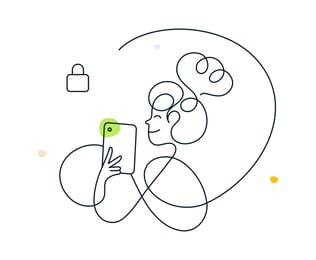
| Download files or content |
38% |
| Registering for an account with personal details |
36% |
| Use public WiFi |
30% |
| Purchase an item online |
27% |
| Share things on social media |
26% |
| Using online payment services (such as Paypal) |
22% |
| Online banking |
20% |
| Continue using a service that had a data breach |
18% |
| View adult content |
17% |
| Using voice activated smart devices (e.g. Amazon Echo, Google Home) |
15% |
| Using my webcam in virtual calls |
14% |
| Book a holiday online |
9% |
| File taxes online |
7% |

| Global |
Strongly or slightly agree |
| I know my privacy rights very well |
53% |
| I usually read websites' and apps' privacy policy before sharing my data |
49% |
| I have strong trust in data protection laws |
43% |
| The protection of my data is very important to me |
83% |
| I think calls for more data protection and privacy are often exaggerated |
34% |
Conclusion
Looking ahead, the future looks decidedly bright for the internet.
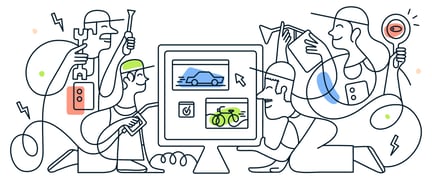
More and more people, including those who previously questioned their interest in going online, have turned to the World Wide Web to connect with friends and family, research health information, and enrich their lives.
But our data show clearly that those same people aren’t so keen on the idea of doing so in an environment where bad actors, hackers, and security threats abound. And more than ever, people of all ages are loath to engage in certain activities for fear that their actions will leave their data and personal information lost to bad actors.
The internet is at a crossroads. More people want to use it, but people also fear the risks that exist, constraining their behavior.
Those same people, however, run the risk of missing out on the internet’s greatness if they continue to allow their fear and worry to consume them.
Yes, security risks exist, but there are solutions to that that can at least mitigate some of the risk. Most importantly, those solutions can also help to blunt the damage hackers could make if they are successful.
The internet is at a crossroads. More people want to use it, but people also fear the risks that exist, constraining their behavior. We as digital citizens must work alongside our fellow internet users to help them reduce their risks, enjoy their time on the internet, and get back to living their digital lives. It’s against that backdrop that true digital opportunities exist.


 Six in ten online users around the world say that the pandemic caused the internet to take on greater importance in their lives.
Six in ten online users around the world say that the pandemic caused the internet to take on greater importance in their lives.





 Two-thirds of internet users around the world, including 54% of those over the age of 65 report using social media services like Facebook, Instagram, and Twitter at least once a day. Another 16% of people use social media sites several times a week.
Two-thirds of internet users around the world, including 54% of those over the age of 65 report using social media services like Facebook, Instagram, and Twitter at least once a day. Another 16% of people use social media sites several times a week.


 Video calling became a way of life for many during the height of the pandemic. In fact, 22% of people around the globe said the pandemic forced them for the first time to start using video calling services. But it was all for a good cause:
Video calling became a way of life for many during the height of the pandemic. In fact, 22% of people around the globe said the pandemic forced them for the first time to start using video calling services. But it was all for a good cause:

 And it’s perhaps no surprise that security and privacy took center stage in the average global citizen’s concerns about their renewed interest in the internet. Indeed, security and privacy appears to be top-of-mind with many respondents. More than eight in ten of global digital citizens said
And it’s perhaps no surprise that security and privacy took center stage in the average global citizen’s concerns about their renewed interest in the internet. Indeed, security and privacy appears to be top-of-mind with many respondents. More than eight in ten of global digital citizens said  Our survey found that women were more likely than men to worry about privacy and security concerns, and 69% of those over the age of 65 had security and privacy worries, outpacing their younger counterparts. Despite that, the results from our survey clearly illustrate just how loath people are to engage in any activity they deem unsafe.
Our survey found that women were more likely than men to worry about privacy and security concerns, and 69% of those over the age of 65 had security and privacy worries, outpacing their younger counterparts. Despite that, the results from our survey clearly illustrate just how loath people are to engage in any activity they deem unsafe.









